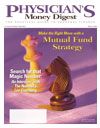Don't Let Ego Undermine Fiscal Security
You need to be pretty thickskinnedto practice medicinetoday and withstand the pressurescoming at you from patients,insurance companies, and hospitaladministrators—to name a few. Egodrivenconfidence goes a long way inthe face of this triple threat. But whenit comes to financial planning, yourego almost always pushes you towardbad decisions. Mixing strong emotionswith managing money is like theproverbial bad cocktail.
Ego can bollix your investments if itmakes you think you're an investmentgenius. Many people won't sell investmentsthat have lost money and showlittle promise of ever recovering. They'dhave to admit that they made a mistake,and their ego won't let them do that.
Conversely, some doctors won't sellwinning investments and take profits.Their ego has become attached to theirinvestments. Subconsciously, it's tellingthem, "Mega.com is up 90% since youbought it. You're wicked smart!" If youlisten to that siren song, you'll probablyinvest in other risky stocks, and nexttime you might lose 90%.
More than a few physicians are strugglingfinancially. After all their hardwork, they understandably want to leadthe good life. They buy the biggest housethey can afford, take out a backbreakingmortgage, drive a new car, and go onlavish vacations. Though seemingly rich,they're actually cash-poor.
Living beyond your means, not saving,and running up ever-increasing creditcard and home equity loan debts areall symptoms that your ego is drivingyou to lead a lifestyle you can't afford. Ifyour ego gets in the way of good decisionmaking, it doesn't mean you're abad person, it just means you're human.And physicians are hardly unique—many other highly paid people withstrong egos are in the same boat.
The first step is self-examinationand awareness. Take a look at yourfinancial situation. If your portfolioisn't diversified and you're strugglingto pay your bills—then it's pretty likelythat the same strong personality thatserves you well in your career is a disserviceto you financially.
You don't have to be in dire straitseither. Your financial situation may beacceptable—but far from optimal—because your ego is interfering. Whetheryour finances are in critical condition orjust a bit rundown, a money "doctor" can help. A carefully chosen financialadvisor who's aware of the emotionalissues of money can bring an outsider'sobjectivity that removes ego-drivenemotions and puts your financial planon rational footing.
David Strulowitz is a fee-based financial
planner and investment advisor in Lincolnwood,
Ill. An attorney, he also holds a master's
degree in tax law and is the coauthor of
a book, The Intelligent Guide to Your
Financial Future (Pen & Ivy; 2005). For more information,
visit www.davidstrulowitz.com. He welcomes questions or
comments at 847-679-9180 or dstrulow@pinfs.com.
